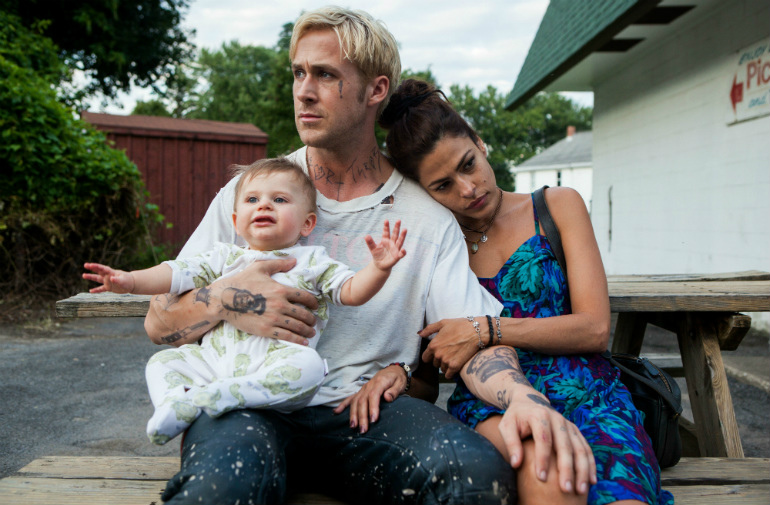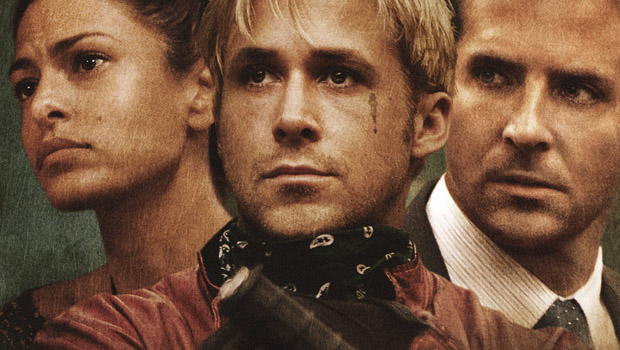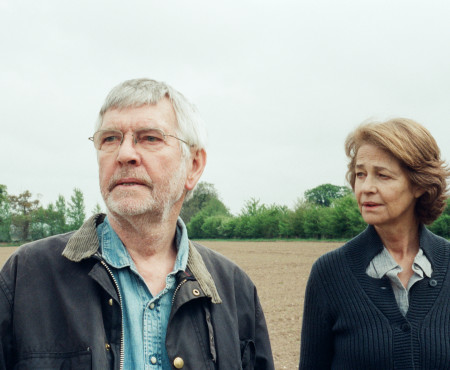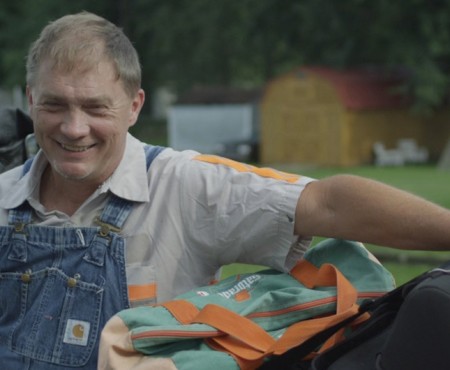A-
Two years ago, Derek Cianfrance made his narrative feature debut with the emotionally-charged, uncomfortable-yet-beautiful romantic drama Blue Valentine, which was about the despair and devastation of romantic relationships and the pain they leave behind. Cut to the present day with Cianfrance’s sophomore effort and a common theme has already been established for the director. The Place Beyond the Pines chronicles that same kind of lingering despair and devastation, only this time in the realm of familial issues, with a strong emphasis on fathers and sons. But unlike most sophomore films, Cianfrance decides with this feature to make a huge jump in ambition and scope.
The film begins with stunt motorcyclist Luke (Ryan Gosling) realizing that a one-time fling with a woman named Romina (Eva Mendes) has resulted in the conception of a child of his own. Realizing he wants to take care of the boy, he quits his traveling-circus job in order to focus his duties on the child. Aside from being low on money, Luke observes that Romina already has someone stepping up as the father figure (Mahershala Ali).
That’s just how the film begins…
But by the time this 3 part, 2 hour and 20 minute opus is finished, you’ll look back at those opening moments and realize just how deftly Cianfrance and co. have woven a breadth of scale into into its intimate styles, themes, and stories. The Place Beyond the Pines is a mostly love-it-or-hate-it kind of experience. Some will love the film for its scope, ideas, and passion; some will find it to be overbearing, over-stuffed, and too hokey with its uses of fate and coincidence in the latter third; and others will merely be left cold by its staggering ambition, leaving with only appreciation for its effort.
The true test of the viewers’ endurance will be in whether they can buy the radical shift in story, pace, and tone the film takes once the first act is complete. Divided into three parts and utilizing four uniquely different protagonists, each segment evolves the story further and further until the final act is almost unrecognizable in comparison to the first. This isn’t like Magnolia or Cloud Atlas where the different parts intercut between each other as the events play out simultaneously. While all three segments remain connected in theme, the film plays out more traditionally with a chronological order to its events. This, ironically, makes the structure even more jarring as we follow certain characters for over half an hour and have them mostly abandoned for a good portion of the film before they either come back or remain left behind.
What makes this structure work, however, is how passionately and gorgeously told this story is. Even as The Place Beyond the Pines careens from one situation to the next, evolving and adapting to its new elements as it goes along, what remains constant is the sense of authenticity in every scene, a mysterious and evocative atmosphere supplanted by earthy cinematography and a moody score, strong empathy for each of its damaged characters, and powerhouse performances from a game cast.

Ryan Gosling has been billed as the lead actor here, and he’s just as mesmerizing in this role as he was in Drive, with his quiet stoicism and suppressed rage in check. Eva Mendes hasn’t been this good in a long time and Ray Liotta is impressive in his small role, but the real standout is Bradley Cooper, who gives the best performance of his career in a difficult role that pays off with nuance and subtlety. There are more great actors in the main cast, but to expound upon them would only lead to giveaways of where the film heads later on that the marketing has slyly kept secret. Needless to say, every single cast member is A-grade good.
Yet with such a large cast and story under his belt, Cianfrance never loses sight of the bigger–or in this case, smaller–picture at play. As huge as his canvas is, he remains focused on the microcosm of his characters’ lives, while leaving the larger themes in the background as a means of adding texture and detail to the film instead of hammering home a message. His camera closely follows and lingers on each individual in a way that doesn’t feel claustrophobic but instead intimate.
The Place Beyond the Pines still manages to feel weirdly stylized thanks to the filmmakers’ keen ear for evocative sound design, utilizing echoing choral and piano notes that feel contradictory to the small events on screen, but further accentuate the fact that this is, in fact, an epic and not just another indie drama. These difficult balancing acts of formalism, realism, intimacy and mythology are accomplished thanks to Cianfrance’s careful placement of the elements.
This deft balance won’t stop many for calling the film too ambitious for its own good, but it’s a clear sign that Cianfrance clearly knows what he’s doing and what he wants to convey with this story. Such a grand vision is worthy of celebration.
If there’s a flaw in the film, it’s that there are a couple extraneous plot-developments that could have easily been dropped without interrupting the already lengthy flow of the story. As good as Liotta is, he’s part of the weakest sub-plot of the film, which involves a scandal in the police department among other things. It’s not that it’s bad or unimportant to the overarching themes, but it doesn’t feel as fully integrated into said themes as everything else in the film.
Outside of that, I can’t tell whether viewers will love, loathe, or just merely appreciate what The Place Beyond the Pines has to offer. What I can promise is a powerful, towering, yet intimately-told epic with excellent performances, a unique structure, and a story that’s told with as much passion and angst as the myriad of sons in the film, all of whom become the fathers of their own legacy, whether they want to or not.




















